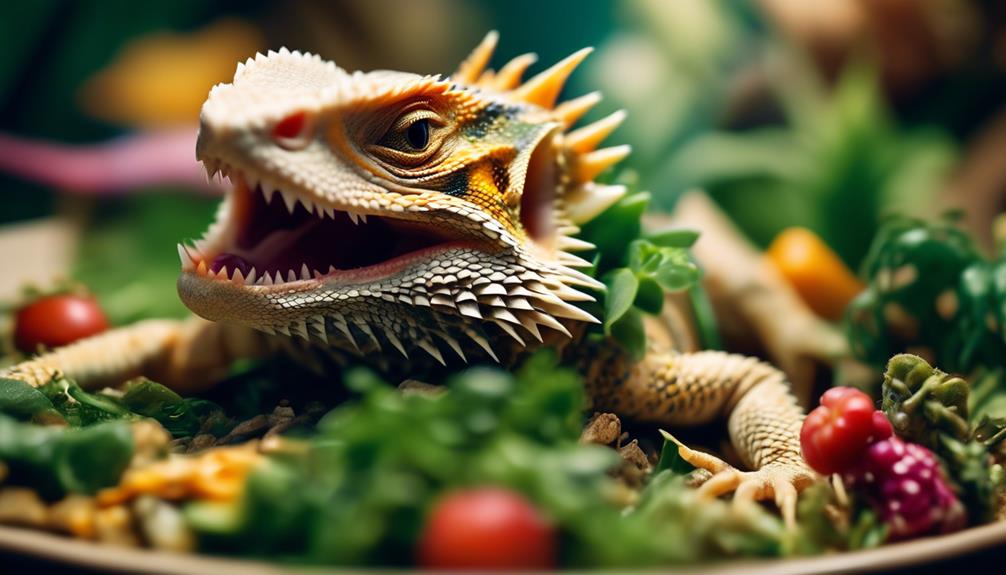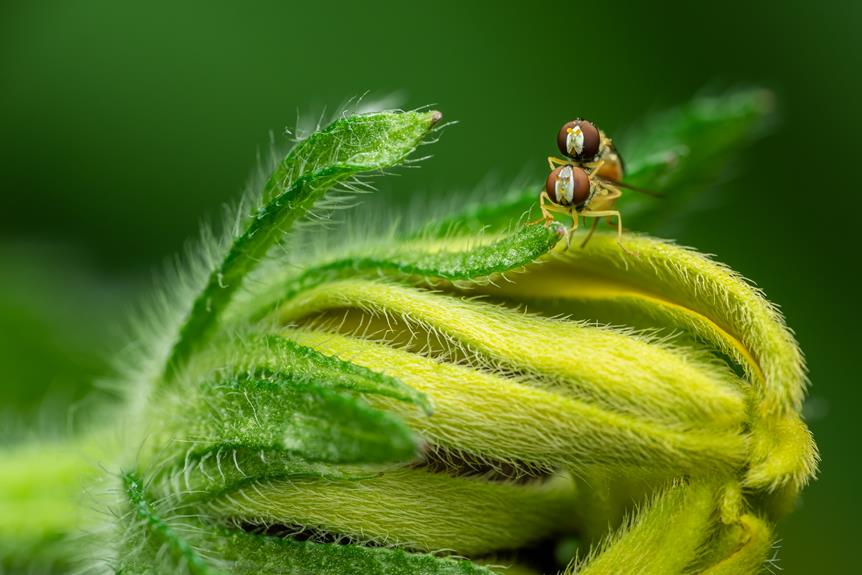As reptile enthusiasts, we thought we knew everything there was to know about bearded dragons. However, our recent discoveries have left us astounded, realizing there is so much more to their hunger than we ever imagined.
These majestic creatures have a feeding behavior that goes beyond the simple act of consuming insects and vegetables. Intrigued? Well, hold on tight as we uncover the surprising truths about bearded dragon's hunger and delve into the fascinating world of their appetite.
You won't want to miss what we've uncovered!
Key Takeaways
- Understanding the feeding needs and behavior of bearded dragons is crucial for their proper care and well-being.
- Factors such as a consistent feeding schedule, appropriate temperature, and minimizing stress and illness can affect their feeding habits.
- Common misconceptions include overfeeding, providing inappropriate insects, and neglecting a varied diet to prevent nutritional deficiencies.
- Recognizing signs of a healthy appetite, maintaining a suitable environment, and monitoring weight and body condition are important for their overall health.
The Importance of Understanding Bearded Dragon's Appetite
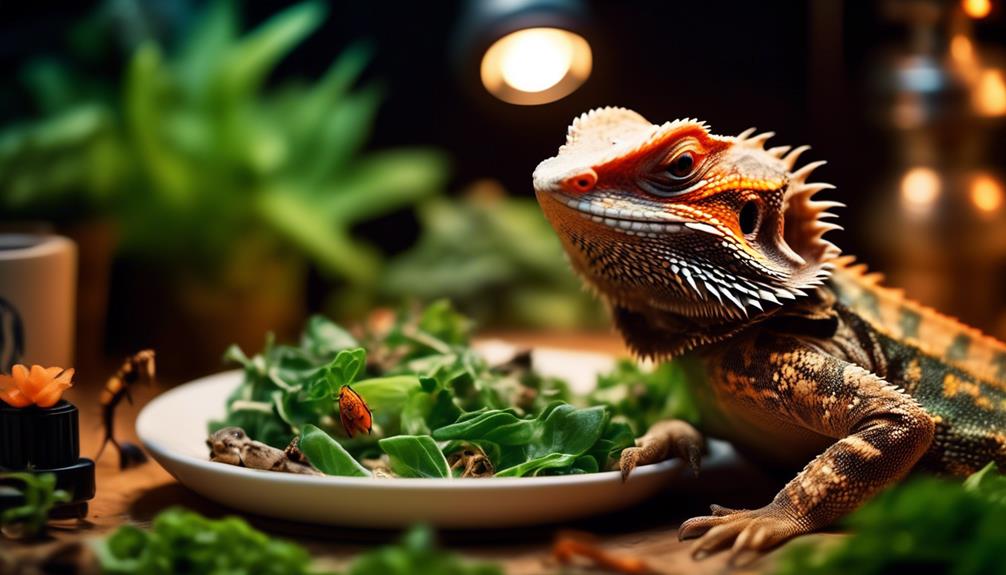
Understanding the bearded dragon's appetite is crucial for ensuring their proper care and well-being. To fully grasp their feeding needs, it's essential to comprehend their behavior and establish a suitable feeding schedule.
Bearded dragons are diurnal reptiles, which means they're active during the day and require a consistent feeding routine. Observing their behavior can provide valuable insights into their hunger levels and preferences.
It's recommended to offer a variety of nutritious foods, such as insects and leafy greens, to meet their dietary requirements. Younger bearded dragons may require more frequent feedings, while adults can be fed less often.
Providing a balanced and appropriate diet, along with a consistent feeding schedule, is key to maintaining the health and vitality of these remarkable creatures.
Factors Affecting Bearded Dragon's Feeding Habits
Several factors can influence the feeding habits of bearded dragons.
One important factor is the bearded dragon's feeding schedule. Establishing a consistent feeding schedule is crucial for maintaining the dragon's appetite. Bearded dragons are diurnal reptiles, meaning they're most active during the day. Therefore, it's recommended to feed them during daylight hours when they're most alert and ready to eat.
Another factor that influences their appetite is the temperature of their environment. Bearded dragons are ectothermic, meaning their body temperature is regulated by their surroundings. They require a basking spot with a temperature between 95-105°F to properly digest their food. If the temperature is too low, their metabolism will slow down, resulting in a decreased appetite.
Other factors that can affect their feeding habits include stress, illness, and the type of food being offered. It's important for bearded dragon owners to be aware of these factors and make the necessary adjustments to ensure their pet's optimal health and appetite.
Common Misconceptions About Bearded Dragon's Hunger
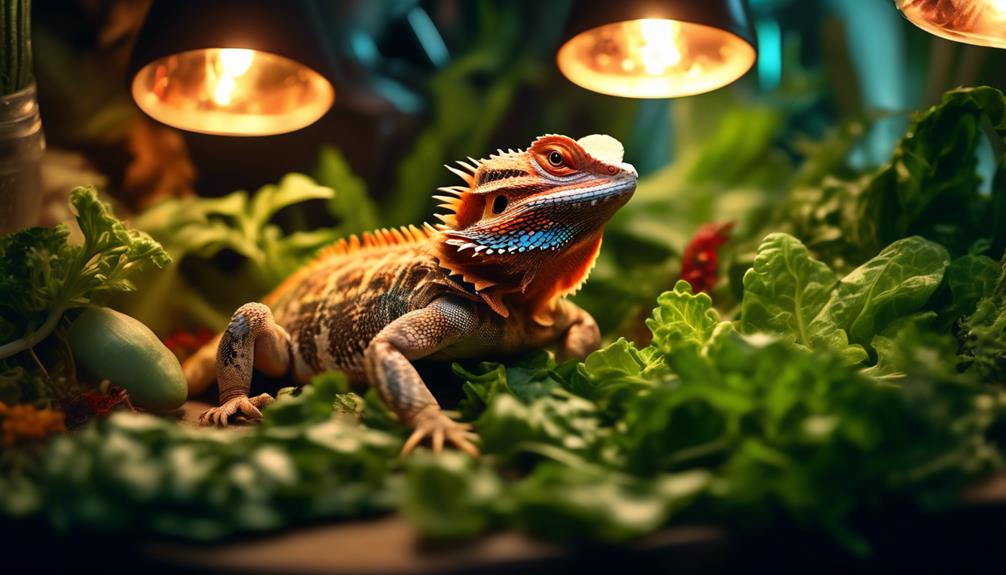
There are several misconceptions about the hunger of bearded dragons that need to be addressed. To clarify, here are three common misconceptions about the bearded dragon's hunger:
- Bearded dragons should be fed constantly: Contrary to popular belief, bearded dragons shouldn't be fed an unlimited amount of food. Overfeeding can lead to obesity and other health issues. It's important to follow a proper bearded dragon diet and feeding schedule to ensure their nutritional needs are met without overfeeding.
- Bearded dragons can eat any type of insect: While bearded dragons are known to have a diverse diet, it's crucial to provide them with appropriate insects. Some insects, such as fireflies and ants, can be toxic to bearded dragons. It's important to research and provide safe and nutritious insects for their diet.
- Bearded dragons don't need variety in their diet: Bearded dragons require a varied diet to obtain all the essential nutrients. A diet consisting solely of one type of insect or vegetable can lead to nutritional deficiencies. Offering a variety of insects, such as crickets, mealworms, and dubia roaches, along with a mix of leafy greens and vegetables, ensures a balanced diet for bearded dragons.
Signs of a Healthy Appetite in Bearded Dragons
To further our understanding of bearded dragon health, let's now explore the signs that indicate a healthy appetite in these reptiles. Recognizing these signs can help us identify when our bearded dragons are eating well and thriving.
One common feeding problem in bearded dragons is a lack of appetite, which can be caused by various factors such as illness, stress, or improper husbandry. However, there are ways to stimulate their appetite.
Offering a variety of food options, including live insects and fresh vegetables, can entice a bearded dragon to eat. Additionally, ensuring that the enclosure is properly heated and providing a suitable environment can contribute to a healthy appetite.
It's also important to monitor their weight and body condition to ensure they're consuming an adequate amount of food. By understanding these signs and addressing common feeding problems, we can help maintain a healthy appetite in our bearded dragons.
Tips for Properly Feeding Your Bearded Dragon
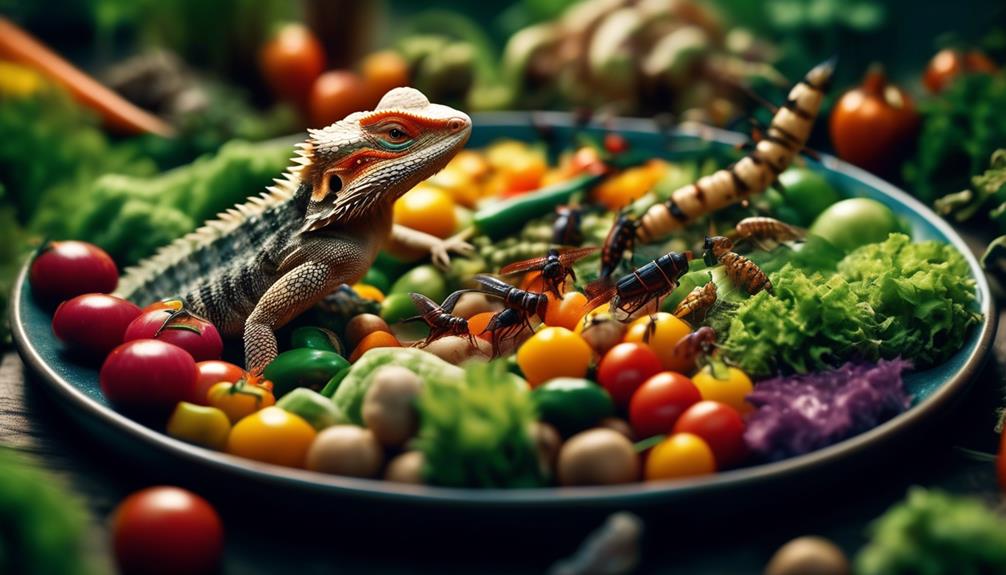
When feeding your bearded dragon, it's important to follow these tips to ensure proper nutrition and overall health:
- Establish a bearded dragon feeding schedule: Bearded dragons thrive on routine, so it's crucial to establish a consistent feeding schedule. Feed your dragon once or twice a day, offering a variety of food items. Young dragons require more frequent feeding, while adults can be fed every other day.
- Provide a balanced diet: The best foods for bearded dragons include a mix of insects, vegetables, and fruits. Offer a variety of insect options such as crickets, mealworms, and dubia roaches. Leafy greens like collard greens and kale should make up the bulk of their vegetable intake, along with occasional fruits like berries and melons.
- Consider calcium and vitamin supplementation: Bearded dragons require calcium and vitamin D3 for proper bone growth and overall health. Dusting their food with a calcium and vitamin supplement two to three times a week helps prevent deficiencies.
Frequently Asked Questions
Can Bearded Dragons Eat Fruits and Vegetables as Their Primary Diet?
Yes, bearded dragons can eat fruits and vegetables as part of their diet. However, it is important to ensure that their nutritional requirements are met by providing a balanced and varied diet.
How Often Should I Feed My Bearded Dragon?
We feed our bearded dragon based on a feeding schedule that meets their nutritional requirements. It's important to consider factors like age, size, and activity level when determining how often to feed them.
What Are the Signs of an Unhealthy Appetite in Bearded Dragons?
What causes and solutions for loss of appetite in bearded dragons? Understanding the link between diet and appetite in bearded dragons is crucial. By analyzing their eating habits, we can identify signs of an unhealthy appetite and take appropriate action.
Can Bearded Dragons Eat Insects Found in the Wild?
Yes, bearded dragons can eat insects found in the wild. Their foraging habits allow them to consume a variety of wild insects, which can provide nutritional value and contribute to their overall diet.
Are There Any Specific Feeding Tips for Bearded Dragons With Health Issues?
Feeding considerations for bearded dragons with health issues may involve dietary modifications. It's important to consult a veterinarian for specific advice tailored to your dragon's needs.
Conclusion
In conclusion, delving into the world of bearded dragon hunger has been a fascinating journey. We've uncovered surprising truths about their complex feeding behavior, debunking common misconceptions along the way.
Understanding the factors that influence their appetite and recognizing signs of healthy feeding is crucial for providing them with the proper care and nutrition.
So, next time you observe your bearded dragon's hunger, remember that it's like peeling back the layers of an onion, revealing the hidden depths of their fascinating world.
